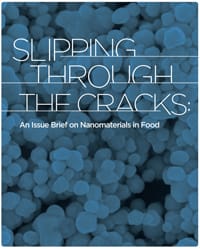[NOTE: The U.S. Department of Agriculture’s (USDA) National Organic Standards Board passed a recommendation in 2010 directing the USDA National Organic Program to prohibit engineered nanomaterials from certified organic products as expeditiously as possible.]
Slipping Through the Cracks: An Issue Brief on Nanomaterials in Food was released today by As You Sow, a nonprofit organization that promotes corporate responsibility and environmental health.
 The briefing includes results of a survey of 2,500 food companies about their use of nanomaterials in food products, as well as laboratory results showing titanium dioxide (TiO2) nanoparticles in the white powdered sugar that coats Dunkin’ Donuts Powdered Cake Donuts and Hostess Donettes.
The briefing includes results of a survey of 2,500 food companies about their use of nanomaterials in food products, as well as laboratory results showing titanium dioxide (TiO2) nanoparticles in the white powdered sugar that coats Dunkin’ Donuts Powdered Cake Donuts and Hostess Donettes.
“This unregulated new technology is clearly entering our food supply,” said As You Sow CEO Andrew Behar. “There has been little, if any, safety testing and there is no transparency on what products contain them. As we learned from our survey, many companies may not even know that they have nanomaterials in their supply chain.”
Nanomaterials have been heralded as having the potential to revolutionize the food industry – from enabling production of creamy liquids that contain no fat, to enhancing flavors, improving supplement delivery, providing brighter colors, keeping food fresh longer, or indicating when it spoils. Yet few, if any, studies adequately demonstrate the safety of nanoparticles in food. In fact, scientists are still investigating how nanoparticles will react in the body and what testing methodologies are appropriate to determine this.
“There has been a lot of buzz about the potential for nanomaterials in food, but very little information about the risks to public health,” said Danielle Fugere, As You Sow President and co‐author of the brief. “Much deeper scientific inquiry is needed to prove nanomaterials are safe before they continue to be sold commercially.”
Because of their small size, nanoparticles can to go places in the body that larger particles cannot. Nanoparticles in food or food packaging can gain access via ingestion, inhalation, or skin penetration. Once inside our bodies, nanoparticles can penetrate cell walls and pass into the blood and lymph system.
From there, the particles can circulate through the body and reach potentially sensitive target sites such as the bone marrow, lymph nodes, spleen, liver, and heart, and may also cross the blood‐brain barrier. As You Sow’s survey results indicate that food, food packaging, and supplement companies are not being transparent about their use of nanomaterials.
The survey was sent to 2,500 companies in the food industry, including the 100 largest food processing companies, the 50 largest food distributors, the 75 largest food retailers, the 25 top packaging companies, the 50 top fast food companies, and 187 supplement companies. It yielded only 26 responses and a third of those companies admitted they did not know if nanomaterials are present in their products or supply chains. Only two companies had formal policies on the use of this new food additive that has undergone little or no safety testing.
As You Sow is a nonprofit organization that promotes environmental and social corporate responsibility through shareholder advocacy, coalition building, and innovative legal strategies. For more information, visit www.asyousow.org.

